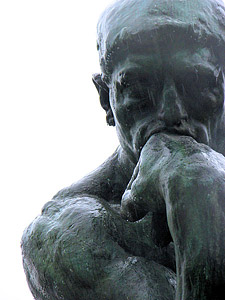 In Temple Grandin’s TED talk, that I watched recently, she discussed her inspirational experiences with autism and how she came to realize that people think in different ways.
In Temple Grandin’s TED talk, that I watched recently, she discussed her inspirational experiences with autism and how she came to realize that people think in different ways.
According to Grandin, there are 3 different types of thinkers.
1. Photo Realistic Visual Thinkers – poor at algebra
2. Pattern Thinkers – music and math
3. Verbal Mind – poor at drawing
That got me to thinking — no wonder screenwriting is so difficult. You have to be all three!
1. Photo Realistic Visual Thinkers
As a screenwriter you must be able to think in pictures. After all, in each scene, you are literally describing what the motion picture camera will see.
Are you a Photo Realistic Visual Thinker?
Do you have an easy time “picturing” exactly what happens in your scenes? How things look and sound? Do you have to suppress that natural tendency to describe elaborate camera angles, visual effects and micro details? Do you have a photographic memory for events?
2. Pattern Thinkers
Similar to most successful songs, most successful movies are not free form experiments. They have a necessary underlying structure, pace and rhythm.
Are you a Pattern Thinker?
Does a 3 act structure feel like a natural framework for the way you tell a story? Are you zealous about formatting and consistency? Do you enjoy setting up payoffs in your script? When you watch movies, can you usually predict the plot twists? Do movie clichés or tropes jump out at you?
3. Verbal Minds
In the end, we are writers that rely on words to tell a story. As such we have to both engage the reader with our word choice and provide an authentic experience when choosing the words of our characters.
Are you a Verbal Mind?
Do you have a good ear for dialogue? When you read a great script, do you sometimes slow down or re-read a passage simply to relish the language? In conversations with your friends, are you able to bust out relevant movie lines? Do people ever compliment you on your diction or vocabulary?
—
How many categories do you naturally fall into? Can the other ways of thinking be learned? Are great screenwriters the ones who excel in all three areas?
Flickr Photo by innoxiuss
Want me to read your screenplay? Please take a look at my script services.





Great post!
I am totally number 3! I do have some good elements of photo/visual thinking… I do have these moments where I can ‘see’ my scene playing out.
But by far my weakness is pattern thinking. Plotting leaves me feeling helpless. So I plan to work on my story skills this year. 🙂
Ron – Thanks! Glad you liked it.
Susan – Great to hear from you!
For plotting and patterns — Blake Snyder to the rescue! I know whenever I’m feeling lost, those Save The Cat! beats as a framework help me tremendously.
Honestly, screenwriting is not that difficult (see http://www.clickok.co.uk/index4.html ). The selling is hard. Or try waterboarding.
What’s hard about selling something awesome? (More on that later.)
I clicked on the link and saw where someone had found great similarities between some popular stories told generations apart. Nice.
But that’s like reverse engineering a car and getting a truck – both have four wheels, shocks, etc. But both are a different ride. Especially if one’s a (your favorite car) and the other is a (your least favorite car).
I think that if I say it’s just the selling that’s hard, that lets me off the hook for objective criticism of my work.
I say getting to awesome is the writer’s hero’s journey.
Great post and thanks for the Temple Grandin link. I actually think the HBO movie on her life last year was better than anything in the theaters. (Yes, including “The Social Network,” “The Kings Speech” and “Toy Story 3.”)
It’s also interesting to note that two films about mathematical geniuses (A Beautiful Mind & Good Will Hunting) both won screenwriting Oscars. How the mind works is a fascinating study and can be a great backdrop for storytelling.
Hey Scott, thanks for the note! I’ve been enjoying your discussions on A BEAUTIFUL MIND and GOOD WILL HUNTING these last few days. There is something immediately compelling about how humans have the ability to rise from the depths of their predicament to reach the heights of human potential.
I loved the Temple Grandin movie as well. I’d still give the nod to The Social Network, but it’s a movie that definitely deserves to be mentioned in the same breath with the ones you’ve listed.
The mind is indeed a great backdrop for storytelling. INCEPTION allowed us once again to tackle the subject of dreams in a visceral, clever, dreamlike way.
I definitely don’t think we’ve seen the last of the cerebral thriller or the brilliant true film biopic that makes it to the silver screen… and the subsequent acadamy award noms.